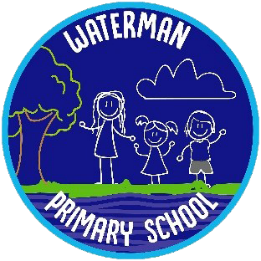T: 01268 546237
waterman.admin@heartsacademy.uk
RE, PSHE & SMSC
Religious Education (RE)
Curriculum Intent:
The RE Curriculum at Waterman Primary School and Nursery ensures that every pupil will:
- relate their own experiences and prior learning about religious viewpoints to a 'big question'
- learn core knowledge about a religion or belief and consider the impact religious beliefs have on a believers’ thinking and on their lives
- focus on the impact of religion on the local and global community
- encounter religion through visitors and visits to places of worship
- have the opportunity to discuss religious and philosophical questions, giving reasons for their own and others beliefs
- develop their creative talents and imagination by using art and design, music, dance and drama
- recognise stereotypes and misrepresentation by considering how religion is portrayed in the media and society
- Reflect on what has been learnt and how their ideas about the ‘big question’ have been developed as a result of their learning.
Implementation:
We use an enquiry based approach to RE and all units begin with children discussing a “Big Question”. Children become able to develop their knowledge, thoughts and opinions about this question as they move through the unit, exploring stories about religion, artefacts and other sources. At the end of the unit, they discuss together what they have learnt and share their new insights and opinions.
Learning about religion is integrated with learning from religion. Adults ensure that pupils are given opportunities to explore issues, questions and concepts related to their own and general human experiences arising from the religious content being covered. We follow the advice in the Essex agreed Syllabus, Understanding Christianity resources and ExploRE.
In RE lessons, children:
- Explore religion through visitors and visits to places of worship, focusing on the impact and reality of religion on the local and global community.
- Consider why people have religious beliefs and why some reject religion.
- Engage in personal reflection and response.
- Discuss religious and philosophical questions and be able to give reasons for their own beliefs and those of others.
- Engage in extended writing, clearly expressing their thoughts and views and also the thoughts and views of others (including believers and non-believers)
- Use art and design, music, dance, drama and ICT to express and communicate their own and others’ insights through .
- Develop the use of ICT, particularly in enhancing awareness of religions and beliefs globally.
- Consider how religion is portrayed in the media and society, recognising stereotypes and misrepresentation.
Please visit HEARTS Academy Trust Curriculum for our RE curriculum.
Personal, Social and Health Education (PSHE)
Curriculum Intent:
It is the aim at our school for our children to understand how to be safe and healthy. We want them to have an awareness of the risks around them and how to manage their academic, personal and social lives responsibly.
The curriculum for PSHE aims to develop fully-rounded pupils who are healthy, sociable and emotionally literate. We use the three pillars of Physical Health and Mental Wellbeing, Living in the Wider World and Relationships to support the pupils' SMSC (Spiritual, Moral, Social and Cultural) education. We focus on preparing children at our school for life in modern Britain. We give them the skills to find and develop their voice and articulate an idea, opinion or argument.
We instil the belief that every child should become a full and active global citizen. We ensure that pupils recognise the power of their actions and the significance of their decisions, encouraging active, pupil-led school leadership. We aim to provide our children with opportunities for them to learn about rights and responsibilities and appreciate what it means to be part of a diverse society. We have the aim of providing pupils with the knowledge they need to be safe and healthy by teaching Relationships and Sex Education (RSE) sensitively and inclusively, with respect to backgrounds and beliefs of pupils and parents. Our values-led curriculum supports our children's personal development and the daily school life we provide (assemblies, Circle time and ‘awareness days/weeks’ ie. Anti-Bullying, Children in Need or Black History Month) enhances this further.
Implementation:
We use a values led curriculum (HEARTS values) that is a ‘golden thread’ through all our teaching and learning.
For example, in English we read ‘Boy at the Back of the Class’ – a text about a refugee living in London and the struggles he and his family face – respect
In Geography we learn about other cultures – for example India and also significant themes that are impacting us today ie. Climate change - responsibility
In Science we learn about culturally significant individuals – ie. Madame C.J Walker (Pioneering female black Scientist – make up products) - achievement
- We develop key concepts and skills through three pillars: Physical Health and Mental Wellbeing, Living in the Wider World and Relationships.
- Lesson planning is informed by a comprehensive and sequenced scheme (3D PSHE.
- Providing opportunities for discussion and informed debate
- Show Racism the Red Card – racist and equality education
- Whole School values-led assemblies (celebrations, stories based on values and singing assemblies)
- Encourage a healthy lifestyle through healthy eating and physical activity
- Supporting charity (Children in Need, Jeans for Genes, Local Women's refuge, Comic Relief, etc…)
Please visit HEARTS Academy Trust Curriculum for our PHSE curriculum.
SMSC
SMSC stands for the spiritual, moral, social and cultural development of all pupils. At Waterman, SMSC underpins much of what we do. SMSC is woven throughout and across our whole school curriculum, is a cornerstone of our community and ethos and permeates the life and work of all stakeholders. We recognise that the personal development of the children – spiritually, morally, socially and culturally – plays a significant role in their ability to learn, and to grow into well rounded members of society.
We aim to provide an education that provides children with opportunities to explore and deepen:
- values and beliefs
- spiritual awareness
- high standards of personal behavior
- a positive, caring attitude towards other people
- an understanding of social and cultural traditions.
We facilitate our vision and aims by fostering values that underpin our entire school curriculum: Happiness, Self-Esteem, Achievement, Respect & Responsibility, Truth, Service & Spirituality. These values are integral to our school and its role in promoting spiritual, moral, social and cultural development (SMSC) of all pupils.
British Values
At Waterman we reflect British values in everything that we do. Children are provided with opportunities to explore their own culture and have a clear understanding and appreciation of a wide range of cultural influences that have shaped modern Britain. Teaching children about ‘British Values’ (Democracy, The Rule of Law, Mutual Respect, Personal Liberty, and Tolerance of others Faiths and Beliefs) has always been a key element of our curriculum and wider philosophy. This is mainly achieved through our Religious Education (RE) and Personal, Social and Health Education (PSHE) curriculums, class and whole school assemblies and our wider curriculum, for example our pupil leaders (School Council, House Captains and Prefects, etc...), educational visits and other opportunities. British Values are also reflected in our behaviour policy.
Address
Waterman Primary SchoolThe BoulevardRochfordSS4 1QF
Useful Links
Contact info
Mr D Wry
Executive Head Teacher
Mrs K Collison
Head of School
Mrs H Purcell
SENDCo & Senior Teacher
Enquiries:
Miss C Day
E: waterman.office@heartsacademy.uk
T: 01702 546237
For any swimming enquiries please email: watermanswimming@heartsacademy.uk
(Calls may be recorded for training and quality purposes)
Office hours
8.30am - 3.30pm
@HeartsTrust
@BriscoePrimary
@StambridgePri
@WatermanPrimary
@WickfordCofESch
@HilltopInfant
@HilltopJun
Website design by Kittle Visual Marketing









